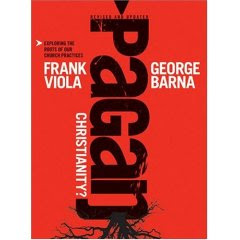
One of the more disturbing problems with the sort of arguments found in ‘Pagan Christianity’ is the lack of understanding of early Christian history, and the relationship of continuity between earliest Christian communities and the communities one finds at the turn of the NT era and at the beginning of the second century when there was still much Jewish Christian influence and character in these communities. Those who want to actually study the influence of the synagogue on early Christian meetings in homes for worship and fellowship should carefully work through James Burtchaell’s important monograph From Synagogue to Church. Public Services and Offices in the Earliest Christian Communities (Cambridge U. Press, 1992). When one examines a text like the Didache, which comes either from late first or early second century Jewish Christian contexts, what is so very interesting about this text, is not only its Jewishness and its use of the Gospel of Matthew’s form of Jesus’ teaching, but its highly developed sacramental theology of both baptism and the Lord’s Supper, a sacramentalism that has nothing to do with pagan rituals, ceremonies or theologies at all.
Here for example is translation of Ivan Lewis of Didache Chapter 10 which comments on the prayer said after the Eucharist, If you read Didache 9 first you will see that clearly the context is a discussion about the Lord’s Supper.
CHAPTER 10
PRAYER AFTER COMMUNION
1) After the meal, give thanks in this manner:
2) We offer thanks, Holy Father,
For Your Holy Name which fills our hearts,
And for the knowledge, faith and eternal life,
You made known to us through Your Servant;
Yours is the glory forever.
3) Almighty Master, You created all things for Your own purpose;
You gave men food and drink to enjoy,
That they might give You thanks;
But to us You freely give spiritual food and drink,
And eternal life through Your Servant.
4) Foremost, we thank You because You are mighty;
Yours is the glory forever.
5) Remember Your Body of Servants,
To deliver it from everything evil
And perfect it according to Your love,
And gather it from the four winds,
Sanctified for Your kingdom which You have prepared for it;
For the power and glory are Yours forever.
6) Let Your grace come,
And let this world pass away.
Hosanna to the God of David!
May all who are holy, come;
Let those who are not, repent.
Maranatha. Amen.
7)But permit the prophets to make Thanksgiving/Eucharist as they wish.
——————
Notice please the reference to the communion providing spiritual food and drink unto everlasting life. The Greek is even clearer than the English.
And just for the sake of comparison let us consider a text from an outsider— Pliny the Roman Governor of Bithynia in A.D. 112-113. Here is what he had observed about early Christian meetings. Pliny has been busy trying to get Christians to worship the image of the Emperor, which most are very unwilling to do. When he inquired of them what their worship practices were, here is the answer he received:
“However, they [the Christians he interviewed from Bithynia] assured me that the main of their fault, or of their mistake was this:-That they were of the habit, on a certain fixed day, to meet together before it was light, and to sing a hymn to Christ, as to a god, alternately; and to oblige themselves by an oath, not to do anything that was ill: but that they would commit no theft, or pilfering, or adultery; that they would not break their promises, or deny what was deposited with them, when it was required back again; after which it was their custom to depart, and to meet again at a common but innocent meal, which they had left off upon that edict which I published at your command, and wherein I had forbidden any such conventicles. These examinations made me think it necessary to inquire by torments what the truth was; which I did of two servant maids, who were called Deaconesses: but still I discovered no more than that they were addicted to a bad and to an extravagant superstition. “
Several things are of note about this revealing passage: 1) the context suggests that the meeting at dawn was on the same exact day each week; 2) it was a morning meeting; 3) the singing of a hymn to Christ as a god was most certainly seen as part of an act of worship, which Pliny countered by trying to get them to worship the image of the Emperor; 4) there would be ethical exhortation and promises made of virtuous behavior; 5) notice the part in italics above about how after the worship time they would depart and meet again to share a common meal. It is this latter part that is said to have been abandoned upon the edict of Pliny because it was an indoor meeting that suggested something of a conventicle or secret society was being set up; 6) note the reference to deaconesses involve presumably in both the worship of the set day and the common meal at different local. Perhaps they were tasked with the serving of the meal, since diakonia in its root meaning is ‘to wait on tables’.
Now it is precisely this sort of early evidence that needs to be used to help provide context for the proper reading of the NT evidence about meetings in homes and their character and praxis. When one does this, it is interesting to see that in the latter text the common meal is separated from the worship at sunrise, and the former is what is seen as more pernicious or threatening to the Empire.

